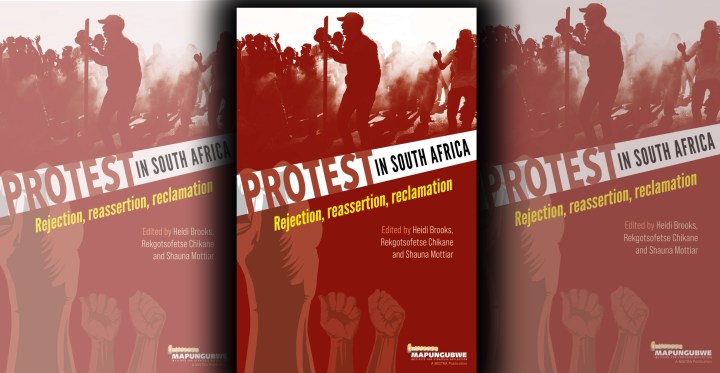BOOK LAUNCH
Getting to the roots of contemporary protests in South Africa

The Mapungubwe Institute for Strategic Reflection’s (Mistra’s) latest edited research volume, in partnership with the Wits School of Governance, seeks to answer the question of why mass protests in SA have escalated, especially during the past 20 years, says Joel Netshitenzhe, executive director of Mistra.
‘It is a book whose time has come. There is quite a [lot of] literature both internationally and in South Africa on protests, the manifestations and implications of protest. And yet in the last few years, there has not been a systematic study that undertakes that,” said Susan Booysen, the director of research at the Mapungubwe Institute for Strategic Reflection (Mistra).
Booysen was speaking at the launch of Mistra’s latest edited research volume in partnership with the Wits School of Governance. Titled Protest in South Africa: Rejection, reassertion, reclamation, the publication, edited by Heidi Brooks, Rekgotsofetse Chikane and Shauna Mottiar, explores the underpinnings of contemporary protest and its short-term causes and structural drivers.
Infrastructural citizenship
Mottiar’s chapter examines electricity contestations in Lamontville from the perspectives of self-connected residents in the informal settlement of KwaMadlala and residents who access Eskom services in the formal area of Dizababa.
“In 2020 in Lamontville, formal householders removed illegal electricity connections of informal householders as these connections were beginning to impact their power supply,” said Mottiar. This resulted in protest action by the informal householders, in the form of barricading roads and burning down municipal offices.
“My chapter examines the ways in which the state is visible at the everyday spatial and temporal scale through infrastructure, and how infrastructure is also a conduit for identities,” she said.
The case study applies the idea of “infrastructural citizenship” to these contestations, to understand how electricity infrastructure is used in an attempt to shape residents’ behaviour into “appropriate” forms. It shows how this is resisted, but also how communities are divided according to their differential status concerning infrastructure, she explained.
‘A perverse system of incentives’
Sethulego Matebesi’s chapter is centred on transactional activism. “There are no signs that these community protests will soon end in South Africa, so what I’m aiming at is a chapter that illustrates the engagement practices of these community groups,” said Matebesi.
Transactional activism refers to the “perverse system of incentives” where state actors provide leaders of protest groups with incentives, he explained.
“It has a huge impact on the agency, and also the future of community organising in South Africa,” he added.
“What is important about this chapter is that it points to the fact that by starting to pay attention not only to the causes of protests, but also to the leadership context, it can help us explain the engagement practices that have started to affect the operations of community groupings, and have led to a vicious cycle of community protests in South Africa.”
Weaponising grassroots democracy
Luke Sinwell, Terri Maggott and Trevor Ngwane make use of a case study of Operation Dudula and Kopanang Africa Against Xenophobia to argue that grassroots mobilisations can be activated in a manner that either sustains a system of racial capitalism or is employed as a mechanism to liberate the oppressed.
“We take the view of looking at the politics of grassroots mobilisation, and we look at how grassroots democracy can be a tool to maintain the status quo, to oppress or to liberate,” explained Sinwell.
Visit Daily Maverick’s home page for more news, analysis and investigations
The outcome of a community mobilisation can be affected by who goes to the community, and with what ideological framing the individual goes to the community, he added. The mob killing of Elvis Nyathi, a Zimbabwean national illustrates this. In April 2022, Diepsloot residents took to the streets to protest against a series of murders, high crime rates and ineffective policing. Police Minister Bheki Cele arrived in Diepsloot to address the angry community and advised them not to take the law into their own hands.
However, the fracas had already attracted the attention of Operation Dudula, and that night, after Cele left, Nyathi was dragged out of his house, beaten, stoned and set alight.
“Operation Dudula identified a place where it could intervene because people were already fighting against crime and indicating that Zimbabweans were the problem, Nhlanhla Lux [Dlamimi] promoted active citizenship underpinned by a particular ideology which arguably leads to the weaponisation of grassroots,” Sinwell added.
Linking theory carefully and concretely to grassroots politics and leadership in impoverished communities may be able to prevent the weaponisation of grassroots democracy and thereby prevent the killing of more individuals like Elvis Nyathi, he explained. DM/MC




















 Become an Insider
Become an Insider
Comments - Please login in order to comment.